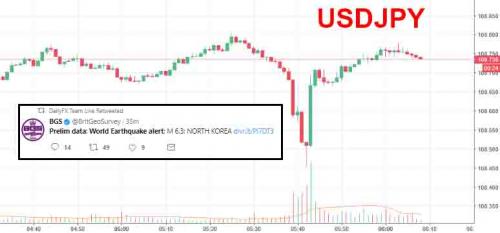Global risk sentiment remained gloomy coming into Wednesday, with global European and Asian stocks sliding on growing concerns about North Korea and political inaction in the US, another hurricane bearing down on the US and the American debt ceiling looming. Industrial metals dropped as the latest Chinese commodity bubble appears to have peaked. Shortly before 6am a sharp risk-off move across asset classes was blamed on an erroneous North Korea earthquake tweet by the British Geological Survey.

In European markets, almost every sector of the Stoxx Europe 600 Index retreated after equities slid from Hong Kong to Sydney as traders prepared for potential news of intercontinental ballistic missile launch by Pyongyang. U.S. stock futures fluctuated, and the dollar edged lower with Treasuries a day after dovish comments from Federal Reserve officials sparked a bond surge. The Bloomberg Commodity Index retreated from the highest since April even as crude oil extended a rally.
“The 10 basis point fall in Treasury yields is clearly not something the European market can ignore,†said Mizuho rates strategist Antoine Bouvet. “The market’s also taking a bit of view on what the U.S. Federal Reserve will do next.â€
Asia was also mostly in the red, with the MSCI Asia ex Japan index falling 0.5% and Tokyo’s Nikkei hitting a four-month low closing down 0.1%. South Korea’s KOSPI ended down 0.3% at a near four-week low as did Australia’s ASX. The Hang Seng Index declined 0.5% in Hong Kong on low volumes and China’s equity benchmarks were also lower.
According to Bloomberg the case for a continued risk-off tone was supported by a lack of consensus among the U.S., Russia and China on how to pressure Kim Jong Un to abandon his nuclear ambitions. Russian President Vladimir Putin rejected U.S. calls for more sanctions, echoing China’s resistance to more punitive measures. Still, despite the sharply lower “risk off” move in yields, equities refuse to budge and remain just shy of all time highs.


The euro was also stable ahead of the ECB announcement due in just over 24 hours: tomorrow Mario Draghi is expected to give more clarity on winding down the European Central Bank’s bond-buying program when he speaks after a policy decision on Thursday, even as he looks for ways to keep the common currency below 1.20.
Speaking of the Euro, in currency trading, the dollar was on the backfoot as geopolitical concerns continued to support the yen; as noted previously a delayed Twitter posting from the British Geological Survey on a North Korea earthquake caused a brief spike in the yen before investors realized it was a reference to last week’s nuclear tests. The Canadian dollar was steady ahead of BOC’s review, with economists forecasting policy makers to be on hold. The Bloomberg Dollar Spot Index held its 0.3 percent loss from Tuesday after Fed Governor Lael Brainard said the U.S. central bank needs to pay careful attention to underlying inflation before raising interest rates again, while Minneapolis Fed President Neel Kashkari said rate increases may be “doing real harm†to the economy.
“The broad-based theme appears to be justifiable caution despite the USD weakness stemming from dovish remarks from Brainard building on U.S. debt ceiling risks that have plunged UST yields, and correspondingly the USD,†said Vishu Varathan, Singapore-based head of economics and strategy at Mizuho Bank Ltd. “But the KRW is the dead give-away that risk aversion appears to be multi-faceted, and not a creature confined to the USD.â€
In Asia, most emerging currencies (with the notable exception of the “safe trade” Yen) fell as concern over any potential fresh provocations from North Korea dominated sentiment, offsetting the impact of dovish comments from Federal Reserve officials. The won led losses, while Malaysia’s ringgit bucked the trend after oil prices jumped Tuesday.
The MSCI EM Asia Index of shares fell while bonds mostly rose. Among the Group-of-10 currencies, the yen rose against the dollar for a third day, while the Aussie erased gains after second-quarter economic growth missed forecasts.
U.S. Treasuries fell after 10-year yields tumbled to the lowest this year; Hurricane Irma was on a path that may bring it ashore in Florida and destroy so much property that damages may surpass Hurricane Katrina. The yield on 10-year Treasuries climbed two basis points to 2.08%.Germany’s 10-year yield also gained two basis points to 0.35% while Britain’s 10-year gilt dipped less than one basis point to 1.026%.
There was some good news for oil bulls with Brent and WTI continuing their recent rally with futures in New York topping $49/bbl for 1st time since Aug 14. Brent also extends gains, hitting day-high $54/bbl, highest since May 25. Brent volume spiked to day-highs at 10:55am London time as prices broke through Tuesday highs.Gold gained less than 0.05 percent to $1,340.08 an ounce.The Bloomberg Commodity Index declined 0.1 percent to 85.29, the first retreat in a week.
Looking ahead, we get MBA mortgage applications, trade balance, Markit services PMI and ISM non-manufacture compositethe, while the Federal Reserve releases its Beige Book. Hurricane Irma, a strong Category 5 storm, could make landfall in Florida as early as this weekend.

